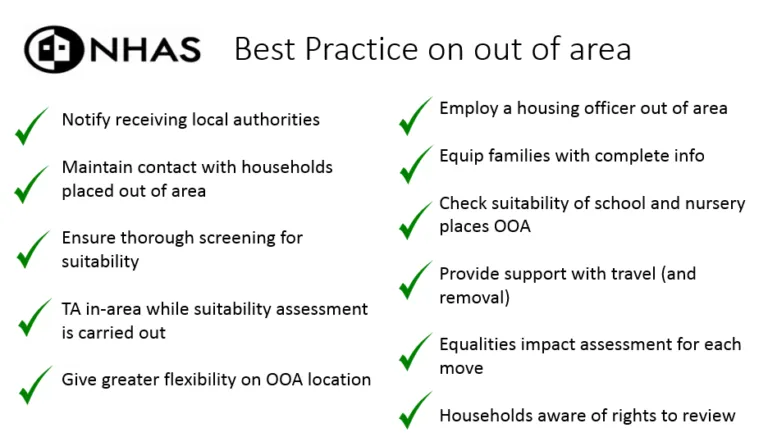Home and away: councils can, and must, improve how they conduct out of area moves
Published: by Jenny Pennington
The National Homelessness Advice Service [NHAS] is a partnership between Shelter and Citizens Advice, funded by the Department for Communities and Local Government. The aim of the service is to enable frontline providers including councils, voluntary agencies and local Citizens Advice Bureaux to deliver good quality housing and homelessness advice, and support the prevention of homelessness where possible.

We asked Vicky Hines, NHAS Partnership Manager – local authorities, to blog for us about good practice tips around out of area placements for councils.
As an avid reader of the DCLG’s Homelessness statistics, it is concerning to see a rise in the number of households, being made homeless and then placed out of their home area. This is further evidenced by Shelter research published in May 2016 that shows that around half of placements made by London authorities in the last year were to housing in a different area.
It is clear that councils are under immense pressure. A shortage of affordable homes combined with the impacts from welfare reforms mean that they are struggling to cope with the increased number of homeless families approaching their service. It is this that is driving the trends that we are seeing.
There are strict laws that apply to councils about placing households outside of their area, but out of area placements can be made well within these laws. Many Councils do act within the law.
As Shelter’s research shows, this can still have a negative impact on families. They may feel that they have been moved from their local family, social, education and employment networks or been handed yet another complication on top of a stressful and difficult to resolve situation. This in turn can make them feel isolated, vulnerable and less able to take action.
So it’s important that when councils use out of area placements, they ensure that people, and in particular children, aren’t badly affected.
Following Shelter’s research, NHAS developed ‘Out of Area placements: A Local Authority Good Practice guide’. It recommends that councils across the country think about how they can ensure that they are providing a good service to support families and sets out good practice for councils to consider. The following identifies some of the good practice from the guide:
- Notifying the host authority of an out of area move is a legal requirement – best practice is to make this notification as soon as the offer of out of area accommodation has been accepted by the household. The name of a single point of contact – ideally a manager or senior manager in housing services – should be provided by the placing authority.
- Give households information on the new area – Authorities should support families before during and after the move has taken place. This support could include key information about the area like places of worship, children’s activities and support such as breakfast clubs, employment and social information. As a parent, I would find this invaluable.
- Give information on their rights and duties and ways they could review an offer – councils should ensure that applicants are clear what is happening when they are offered accommodation out of area, this includes their rights to suitable accommodation and what might happen if they decline an offer. This means that people can better decide what’s best for them. If the placing council has accepted a full duty, it must set out in writing that the household can request a review of the suitability of the offer
- Locate Housing officers out of area – some councils have found it useful to employ a housing officer where they have a large supply of temporary accommodation in a host area. This officer can help to identify property of a good standard but also to help settle households into their new home, register in new schools and contact new services.
The complete good practice guide is available to NHAS members on the member’s page of the NHAS website.
Housing officers have a key role in ensuring that the service they deliver on a daily basis is lawful, helps families and prevents further homelessness. Councils, central government and agencies like NHAS need to work together to do this, especially in challenging times.
